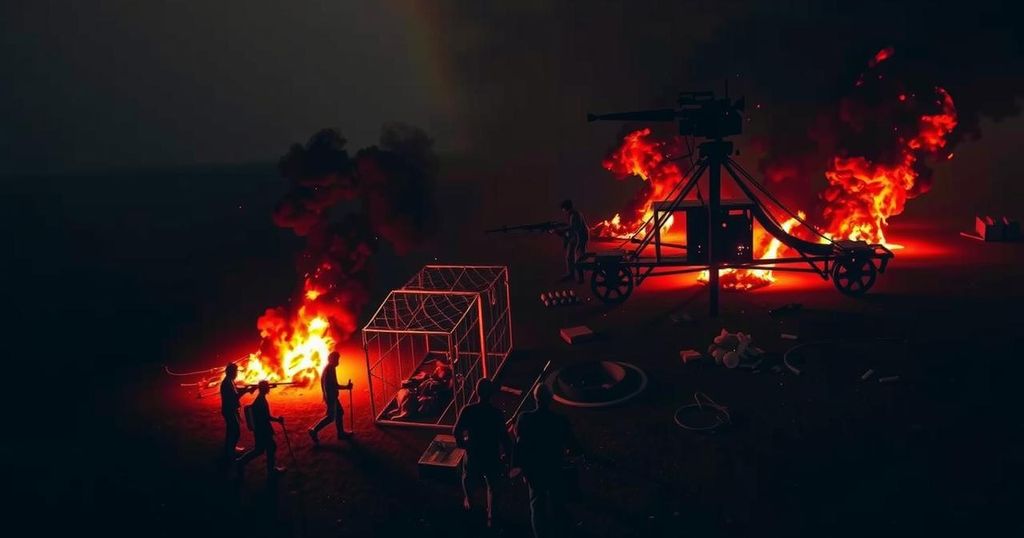Global news
AFRICA, AL - QAIDA, ARMED CONFLICT LOCATION AND EVENT DATA PROJECT, ASIA, BURKINA FASO, CHINA, CIVIL WAR, CONFLICT, ECONOMIST INTELLIGENCE UNIT, ISLAMIC STATE IN THE, JAMA ' AT NUSRAT AL - ISLAM WAL - MUSLIMIN, JNIM, LAKE CHAD, MALI, MILITARY OPERATIONS, MOROCCO, NIGER, SAHEL, SHA, SHAANTANU SHANKAR, TERRORISM
Leila Ramsay
0 Comments
Escalating Violence in Africa’s Sahel: The Rise of Extremism and Instability
Islamic extremist attacks are increasingly prevalent in the Sahel region, with recent assaults leading to significant casualties. Military rule in Mali, Niger, and Burkina Faso has failed to improve security, resulting in rising violence from groups like JNIM and the Islamic State. Economic challenges and local conflicts fuel the crisis, with the situation likely to worsen and expand beyond the Sahel, prompting international counter-terrorism efforts.
In recent months, extremist attacks in Africa’s Sahel region have escalated dramatically. Notably, Islamic militants targeted Bamako, the capital of Mali, for the first time in nearly ten years. Additionally, a violent assault last month by al-Qaida-affiliated jihadis resulted in the deaths of at least 100 civilians and soldiers in Burkina Faso, as they coerced villagers to assist them in fortifying security installations. This reflects a worrying trend of increasing violence in a region long afflicted by instability and conflict.
The Sahel, defined by a history of military coups and uprisings, now sees three of its nations—Mali, Niger, and Burkina Faso—governed by military juntas promising enhanced security. Unfortunately, the situation has deteriorated since their ascension, with civilian casualties reaching alarming levels. According to the Armed Conflict Location and Event Data Project, reported civilian deaths during the first half of the year were 3,064, marking a 25% increase from previous periods.
Two primary extremist factions operate within the Sahel: Jama’at Nusrat al-Islam wal-Muslimin (JNIM), linked to al-Qaida, and the Islamic State in the Sahel. JNIM has notably increased its foothold in Mali and Burkina Faso, integrating various local rebel alliances and gaining community support. Unlike JNIM, the Islamic State operates as a loosely organized entity, predominantly active in the Lake Chad region, with both groups committing violent acts that many organizations categorize as potential war crimes.
Military rulers in the Sahel have exploited public discontent towards previous democratically elected governments, often seen as corrupt and influenced by foreign powers, particularly France. Following their coups, these juntas abandoned the Economic Community of West African States (ECOWAS) for a new security coalition known as the Alliance of Sahel States. As they severed ties with conventional allies, the region faced a significant security void exacerbated by the withdrawal of French and American troops.
Economic decline and a lack of job opportunities serve as additional catalysts for the rise of extremist groups, with recruitment efforts targeting marginalized populations. Local militia conflicts further complicate the situation, creating a self-reinforcing cycle of violence. Analysts note that these groups have diversified methods of financing their operations, through taxing local communities and leveraging control of valuable resources such as gold mining.
As the military governments struggle to maintain power amidst deteriorating conditions, projections indicate a worsening security climate in the Sahel. Analysts suggest that the ripple effects of these instabilities are expanding beyond the region, as extremist activities have begun to infiltrate neighboring nations such as Benin and Nigeria. Presently, international allies, including the United States, are engaged in bolstering counter-terrorism measures across these vulnerable states, although significant barriers remain, particularly the restriction of press freedoms and information control by the ruling juntas.
Africa’s Sahel, a vast arid strip south of the Sahara, has faced relentless extremist violence over recent years, significantly escalating in recent months. The rise of military juntas in Mali, Niger, and Burkina Faso has brought about a complicated security landscape characterized by increased attacks, a high civilian death toll, and the proliferation of extremist groups such as JNIM and the Islamic State. As these factions fortify their presence, the region also encounters the challenges of economic decline, local militia conflicts, and shifting international alliances, all contributing to a turbulent and unpredictable socio-political climate.
The escalating violence in the Sahel region represents a convergence of factors, including military governance, economic despair, and rising extremism. The involvement of diverse militant groups complicates efforts for stabilization as local populations face strained security conditions and atrocities. With extremist activities spilling over into adjoining countries, the urgency for international intervention and coherent counter-terrorism strategies becomes paramount. The evolving security landscape demands thorough evaluation and action to prevent further deterioration and to protect vulnerable communities.
Original Source: www.voanews.com




Post Comment